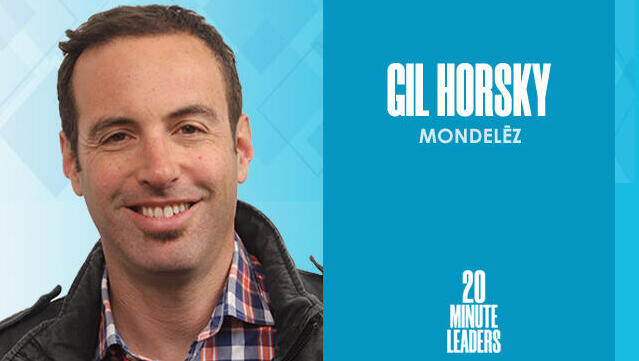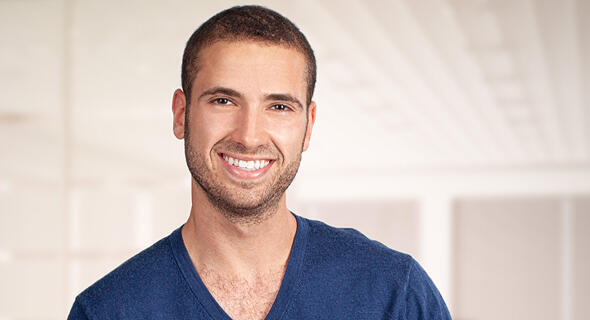
20-Minute Leaders
“Changes in the food industry make it a very fertile ground for innovation”
Gil Horsky, senior director of ventures for SnackFutures at Mondelez, discusses why sustainability, personalization, and demand for locally grown food make the industry a great place for innovation
Food companies have much more data available now than they used to, says Gil Horsky, senior director of ventures for SnackFutures at Mondelez. The challenge now is combing through the insights to find the actionable items. He shares that other shifts, like in sustainability, personalization, and demand for locally grown food, make the industry a great place for innovation. Even big companies like Mondelez have to be reinventing themselves, Horsky explains, and that’s part of his job. SnackFutures invests in early stage startups as well as incubating new businesses, acting like entrepreneurs within a large corporate. While new brands have an easier time breaking into the market today, Horsky explains that it still takes patience to build and scale a brand with physical products. He says he finds great joy in fulfilling consumers’ needs, especially when the products have the emotional connection that food can.
Click Here For More 20MinuteLeaders
What is the future of food? How do we even approach a complicated question like that?
The way we're eating today and what we're eating today is very different than what we ate a few years ago. We all grew up eating three meals a day. Today, we're eating, on average, seven mini meals per day. We're all on the go. We have different needs throughout the day.
The last hundred years have moved the food industry to become much more industrialized and it's much more scale. Mondelez is the largest snacking company in the world. Now, actually, you're seeing a lot of trends of consumers going back to the pre-industrialization phase. People are suddenly looking for locally grown food. The second thing you're seeing is the need of personalization. Each of us has different needs. One of the biggest changes is around sustainability and the circular economy. Is the food grown in a sustainable way? Is the packaging sustainable and recyclable?
All of these things are actually a very fertile ground for innovation. A lot of new startups, a lot of big companies that are needing to reinvent themselves, which makes the food industry so exciting today.
I believe that the shelves in the supermarket are vastly different than even 10 years ago, and the rate of changes and the ability for small brands to pop up and and for large companies to reinvent themselves. What is new to 2022 that allows us to do this rapid invention and innovation?
If you look until 10 years ago, there was only one route to market. You could sell at stores. Suddenly, the retail environment started changing. When you're a small brand, you actually can succeed as much as the big brand in the online space. A lot of retailers were looking for smaller brands to give this experience for consumers with new unique brands.
Asking what is up in 2022, there are a few things. Plant-based is big, so consumers are looking to eat less meat, milk, and seafood. The second thing, which I'm very excited for, is a space of “food is medicine." Instead of taking pills, can your snacks or food have a functional benefit that can be as effective as some of those?
You also asked how the industry is changing for smaller brands. That's one of the reasons why we created SnackFutures. We do three things. We manage the company's corporate venture arms. We make investments in early-stage startups. We invested in Israel in a company called Torr FoodTech that enables you to actually weld together ingredients into snacks without the sugary binder.
The second thing is we actually incubate new businesses. For example, consumers are eating less vegetables, but they're looking to get a vegetable in a snack form. We would actually, like an entrepreneur, work with an outside R&D team, outside co-packers, outside distributors, and incubator brand. We did one in vegetables called Dirt Kitchen. We test it in one market, several stores. If it does well, we scale it up.
Those are some of the things we're doing. We're taking some of the things from the playbook of entrepreneurs and putting them in a big company setting.
Does technology play any role? What can we leverage today in terms of the technology around us, social media, different tracking mechanisms, to even understand whether the product we're putting in the store works?
Technology plays a huge role in the industry. There's the McKinsey study that was done a few years ago about some of the largest industries in the world and their level of digitization. And food and ag was one of the lowest ones.
In the space of market research, in the past, we had to wait sometimes weeks and months to get insights from consumers in the physical world. Today, you can actually do things very quickly. We can put different concepts on Facebook, Instagram. We see what concepts interest people. You have the ability to do focus groups online. We talk with consumers in their homes. We are able to get insights on a daily basis, if we need.
If you want to mine trends and look at what is spoken on social media, we can zoom down to the level of seeing what's happening in New York State or New York City. What are consumers looking for. It gives you a lot of power. I think the bigger challenge is actually distilling your insights from all that. Distilling these for something actionable, that's probably the harder part today.
What are we seeing in terms of micro brands versus the larger brands? What's happening with consumer behavior there?
Ten years ago, you would not see emerging brands. Today, there are a lot of them that have a strong founder story. They would usually start creating a tribe around them of followers and believers and slowly scale up. What we do in SnackFutures is we try to either invest in some of those that are in the well-being snacking space or even build our own.
There's much more openness, both from a retailer and a consumer perspective, to try new things. Obviously, there's still the fundamentals. You have to be a great tasting product. You still need patience building a brand. That's the beauty and the challenge in this industry. We're talking about physical products. It's very different than some of the tech we know that can just go and scale within a night and become very, very big. Here you manufacture, you distribute, you sell, slowly you scale up.
In the past, our playbook was competing against the other big brands. We all were using very similar strategies. Today, we actually need to compete with a lot of smaller brands that are growing very fast. When you're in a dynamic market and you have 20 competitors and they have different playbooks, it just makes you better. For the consumer, it's great because there's more choice.
If we're looking years down the line at snacking behavior, is it going to change?
Our strong belief is that snacking as a behavior is just going to get bigger. I think the interesting part is going to be: how are these snacks going to look in the future? You're even seeing some concepts that are blurring lines. For example, you have a category which is actually meal replacement. It's basically beverages that give you the same nutrients and filling feeling of a meal. I think we're going to see an evolution of these product forms and what needs they are fulfilling.
The second one is: how do we actually get these products? Maybe 10 to 15 years down the road, you're going to have the 3D printer and you're going to print all the snacks for the next day. It could be. Maybe not.
I think the impact that the food industry has on sustainability, climate, and the ecosystem is just going to become a bigger topic.
What do you enjoy most about what you do?
There's not a bigger joy than fulfilling the needs of consumers. The amazing thing in snacks, especially in chocolate and cookies, is that people are emotionally attached to them. There's a lot of research that the first chocolate you ate as a kid, you think is the tastiest chocolate. It's the taste of your childhood. I think it's a very emotionally engaging industry and role.
Working with startups, entrepreneurs, and new technologies to reinvent this industry and bring it to the next stage that will be healthier, more sustainable, and more fulfilling for consumers is super exciting.
Michael Matias, Forbes 30 Under 30, is the author of Age is Only an Int: Lessons I Learned as a Young Entrepreneur. He studies Artificial Intelligence at Stanford University, is a Venture Partner at J-Ventures and was an engineer at Hippo Insurance. Matias previously served as an officer in the 8200 unit. 20MinuteLeaders is a tech entrepreneurship interview series featuring one-on-one interviews with fascinating founders, innovators and thought leaders sharing their journeys and experiences.
Contributing editors: Michael Matias, Megan Ryan
